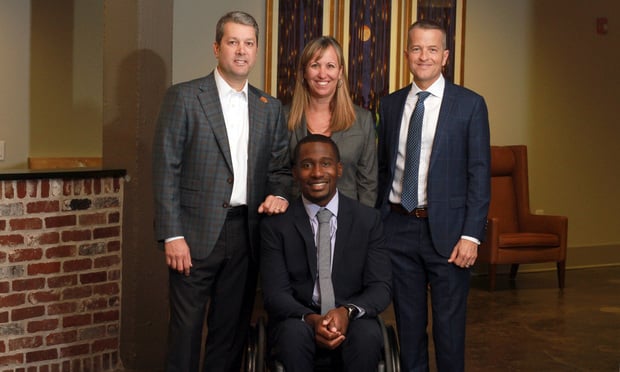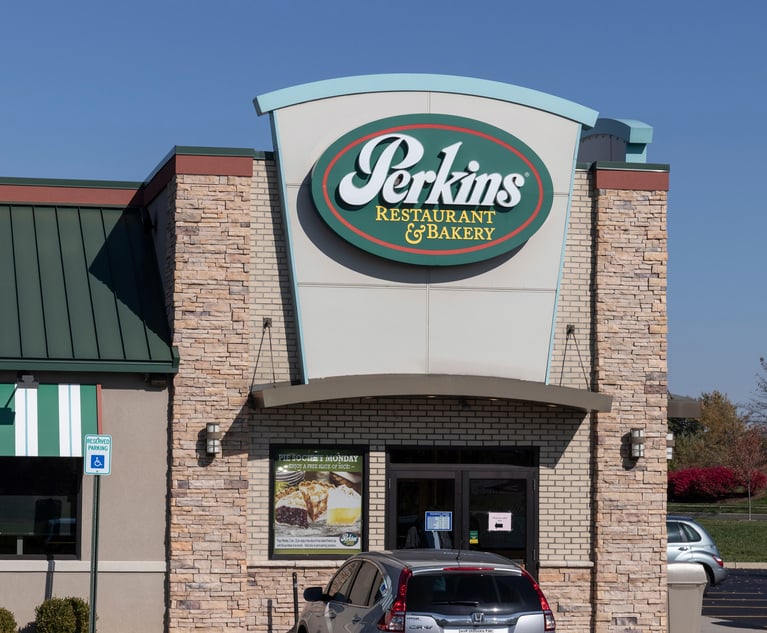DeKalb Jury Awards Nearly $70M in Kroger Parking Lot Robbery-Shooting Case
Navy vet Laquan Taylor was shot multiple times during a robbery and carjacking at the Kroger on Moreland Avenue, leaving him paraplegic.
April 19, 2019 at 05:06 PM
7 minute read
 Pete Law (clockwise, from left), Denise Hoying, Mike Moran with client Laquan Taylor (Photo: John Disney/ALM)
Pete Law (clockwise, from left), Denise Hoying, Mike Moran with client Laquan Taylor (Photo: John Disney/ALM)
On Thursday, a DeKalb County jury delivered a post-apportioned award of more than $69.6 million to a young Navy veteran shot multiple times during a robbery and carjacking at a Moreland Avenue Kroger store, leading to multiple surgeries and leaving him paraplegic.
Lead plaintiff's attorney Peter Law said the evidence was overwhelming that Kroger knew the store was located in an unsafe, high-crime area, yet failed to place any security guards in the parking lot where Laquan Taylor was robbed and shot.
“There was testimony the guy who shot him had been hanging out around there before,” said Law, who tried the case with Law & Moran colleagues E. Michael Moran and Denise Hoying.
The case was originated by Joseph Kuveikis of Duluth's Kuveikis Law.
Law said the defense's highest offer to settle pretrial was for $1 million.
“The offered somewhere around $12 million during the trial,” he said. “We turned that down.”
Law said his client, Laquan Taylor, “is a really great guy. Everybody loved him: the police officers, the defense lawyers, the jury. He's really an inspiration.”
Law said Taylor, who served five years aboard the U.S.S. Abraham Lincoln before his discharge, now serves as a mentor for other injured vets.
Kroger was represented by Weinberg Wheeler Hudgins Gunn & Dial partners Jonathan Krawcheck, Richard Hill II and Frederick Cooper IV.
“Kroger and its trial team wish Mr. Taylor all the best,” said Krawcheck via email, declining to comment on pending litigation.
A co-defendant company that provided in-store security for Kroger, Norred & Associates, was dismissed from the trial case when its attorneys, Charles McDaniel Jr. and Ryan Kolb of Carlock Copeland & Stair, moved for a directed verdict.
Norred “was granted a directed verdict following [Taylor's] and Kroger's presentations of their respective cases in chief,” said McDaniel in an email.
“After presentation of this evidence, the court ruled there was no evidence of a causal connection between Norred's actions and the incident involving Mr. Taylor; Norred was under contract to provide interior security,” McDaniel wrote.
McDaniel said Norred's security officer had been at the store's entrance when the shooting happened, “which is an appropriate location and where the officer was expected to be positioned.”
According to Law and court filings, Taylor was 26 when he visited the Kroger in southeast Atlanta a little after 7 p.m. in January 2015 to do some shopping and use the Western Union outlet there.
Victor Moore and Javon Ross were hanging around the parking lot, Law said.
“Laquan had an orange Camaro, and when he pulled in, they decided they wanted his car and his money,” he said of the men arrested for the crime. Moore and Ross allegedly demanded his keys and wallet. After Taylor handed them over, Ross shot him between 11 and 14 times, and the pair left in his car.
Taylor's car was equipped with an OnStar security system, and responding officers were able to use it to track and disable the vehicle remotely, Law said.
“They couldn't figure out why the car wasn't working and were pushing it down the road when the police got there,” he said.
Ross and Moore are each serving 15-year sentences after pleading guilty to charges including armed robbery, carjacking, possession of a firearm during the commission of a felony and aggravated assault.
Taylor was fortunate to be alive: He was taken to Grady Memorial Hospital, where he underwent 14 surgeries over two months, then spent two more months at Shepherd Center. He spent another seven months in rehab at Tampa's James A. Haley Veterans' Hospital, and underwent two more surgeries.
His medical bills thus far are more than $4.5 million.
Taylor sued Kroger, Western Union and Norred in DeKalb County State Court in 2015 for claims including premises liability, nuisance and negligence.
Following a failed mediation before Gino Brogdon Sr. with Henning Mediation & Arbitration Service last April, Law said Kroger offered $1 million to settle.
“Laquan had more than $4 million in past medicals then,” he said.
Law said his side demanded $40 million before the mediation, but as the case came to trial they indicated they could drop to around $30 million.
Kroger had multiple lawyers of insurance, he said, but the adjuster “just never really engaged, he never seemed to get serious. By the time he was ready to offer some money [during the trial], we weren't interested.”
Judge Wayne Purdom dismissed Western Union pretrial after determining that it was neither an owner or occupier of the premises and had no employees on site, Moran said.
Law said jury selection was so difficult, Purdom had to call in two jury pools to pick a panel.
“Everybody kept saying they couldn't be fair and impartial because they were all strongly in favor of my client,” he said.
During a seven-day trial, Law said several of Taylor's doctors testified; a life-care plan cited in the pretrial order said Taylor's future medical needs would be at least $1.4 million.
Both sides had security experts ready to testify, but they didn't.
“We decided not to call ours, so they didn't call theirs,” Law said.
According to the order, Kroger argued that it was not responsible for Ross and Moore's “heinous actions” and that Taylor's causation claim was “mired in speculation that additional security measures could have prevented the subject criminal attack from occurring.”
During closing arguments Tuesday afternoon, Law said he asked the jury to award $80 million in damages.
The jury deliberated all day Wednesday and about four hours Thursday before awarding $81 million in total damages, but it apportioned 14 percent of the fault to Ross and Moore, for a total award of $69,660,000.
The award included $60 million for “pain and suffering, mental suffering, physical injury, inconvenience, and physical impairment in the past and into the future.”
In conversation with jurors afterward, Law said the panel had no problem finding liability on Kroger's part.
“They said that, to them, it was a clear case, a strong case of negligence,” he said. “Kroger had no security in the parking lot, and they knew they should have had it.”
This content has been archived. It is available through our partners, LexisNexis® and Bloomberg Law.
To view this content, please continue to their sites.
Not a Lexis Subscriber?
Subscribe Now
Not a Bloomberg Law Subscriber?
Subscribe Now
NOT FOR REPRINT
© 2025 ALM Global, LLC, All Rights Reserved. Request academic re-use from www.copyright.com. All other uses, submit a request to [email protected]. For more information visit Asset & Logo Licensing.
You Might Like
View All
Hungry for Stability After Execs Exit, Papa John's Gives Legal Chief Big Retention Bonus
4 minute read
Walmart Ordered to Pay $1.2M by State Jury for Employee-Caused Injury in Georgia Store


Trending Stories
- 1Relaxing Penalties on Discovery Noncompliance Allows Criminal Cases to Get Decided on Merit
- 2Reviewing Judge Merchan's Unconditional Discharge
- 3With New Civil Jury Selection Rule, Litigants Should Carefully Weigh Waiver Risks
- 4Young Lawyers Become Old(er) Lawyers
- 5Caught In the In Between: A Legal Roadmap for the Sandwich Generation
Who Got The Work
J. Brugh Lower of Gibbons has entered an appearance for industrial equipment supplier Devco Corporation in a pending trademark infringement lawsuit. The suit, accusing the defendant of selling knock-off Graco products, was filed Dec. 18 in New Jersey District Court by Rivkin Radler on behalf of Graco Inc. and Graco Minnesota. The case, assigned to U.S. District Judge Zahid N. Quraishi, is 3:24-cv-11294, Graco Inc. et al v. Devco Corporation.
Who Got The Work
Rebecca Maller-Stein and Kent A. Yalowitz of Arnold & Porter Kaye Scholer have entered their appearances for Hanaco Venture Capital and its executives, Lior Prosor and David Frankel, in a pending securities lawsuit. The action, filed on Dec. 24 in New York Southern District Court by Zell, Aron & Co. on behalf of Goldeneye Advisors, accuses the defendants of negligently and fraudulently managing the plaintiff's $1 million investment. The case, assigned to U.S. District Judge Vernon S. Broderick, is 1:24-cv-09918, Goldeneye Advisors, LLC v. Hanaco Venture Capital, Ltd. et al.
Who Got The Work
Attorneys from A&O Shearman has stepped in as defense counsel for Toronto-Dominion Bank and other defendants in a pending securities class action. The suit, filed Dec. 11 in New York Southern District Court by Bleichmar Fonti & Auld, accuses the defendants of concealing the bank's 'pervasive' deficiencies in regards to its compliance with the Bank Secrecy Act and the quality of its anti-money laundering controls. The case, assigned to U.S. District Judge Arun Subramanian, is 1:24-cv-09445, Gonzalez v. The Toronto-Dominion Bank et al.
Who Got The Work
Crown Castle International, a Pennsylvania company providing shared communications infrastructure, has turned to Luke D. Wolf of Gordon Rees Scully Mansukhani to fend off a pending breach-of-contract lawsuit. The court action, filed Nov. 25 in Michigan Eastern District Court by Hooper Hathaway PC on behalf of The Town Residences LLC, accuses Crown Castle of failing to transfer approximately $30,000 in utility payments from T-Mobile in breach of a roof-top lease and assignment agreement. The case, assigned to U.S. District Judge Susan K. Declercq, is 2:24-cv-13131, The Town Residences LLC v. T-Mobile US, Inc. et al.
Who Got The Work
Wilfred P. Coronato and Daniel M. Schwartz of McCarter & English have stepped in as defense counsel to Electrolux Home Products Inc. in a pending product liability lawsuit. The court action, filed Nov. 26 in New York Eastern District Court by Poulos Lopiccolo PC and Nagel Rice LLP on behalf of David Stern, alleges that the defendant's refrigerators’ drawers and shelving repeatedly break and fall apart within months after purchase. The case, assigned to U.S. District Judge Joan M. Azrack, is 2:24-cv-08204, Stern v. Electrolux Home Products, Inc.
Featured Firms
Law Offices of Gary Martin Hays & Associates, P.C.
(470) 294-1674
Law Offices of Mark E. Salomone
(857) 444-6468
Smith & Hassler
(713) 739-1250






